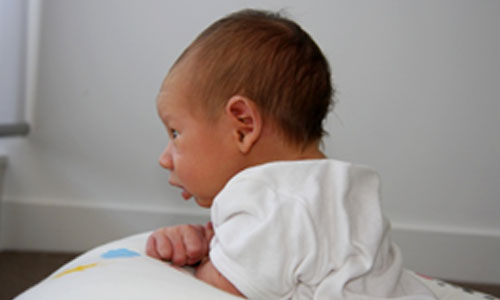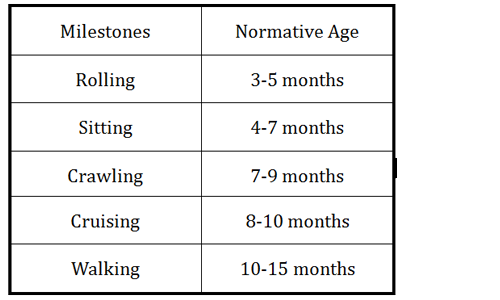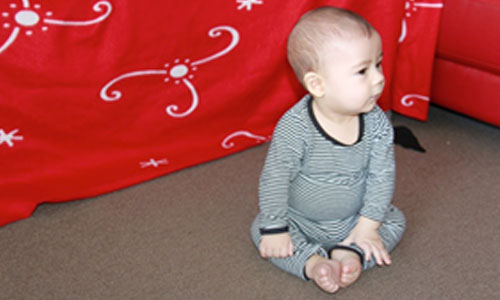
DEVELOPMENT DELAY
Worried that your baby not yet rolling/sitting/crawling or walking when they should be for their age? Do you feel that they are delayed in their development, and you don’t know how to help them? You have come to the right place; we are experts in helping babies achieve their gross motor milestones!
Developmental Delay
Developmental delay refers to the slower rate of development in the domains of gross motor, fine motor, speech/language, cognition and social/personal skills. Global developmental delay refers to delays in two or more developmental domains. Developmental delay can be described as being mild, moderate or severe; where mild delays indicate a child is performing at 1/3 below his chronological age, moderate delays indicate a child is performing at about 1/2 his chronological age, and severe delays indicate a child is performing at about 2/3 below his chronological age.

baby at 3 weeks old doing tummy time
Below is a guide showing the normative age range for the start of Gross Motor Skills development:


Baby at 7 months old sitting independently
Every child is an individual and there is a wide variation in the timing of achievement of each gross motor milestone. However, generally it is expected that an infant should be able to roll by 6 months old, sit by 8 months old, crawl and pull to stand taking steps around furniture by 12 months old, and walking independently by 18-19 months old.
Often due to various reasons an infant does not achieve their gross motor milestones, but alarm bells don’t sound till about 2 years of age. History-taking will indicate the infant was already showing delayed gross motor skills by 6-8 months of age.
Often these infants with delays in their gross motor development also have delayed speech development or delayed fine motor development. Research has shown that developmental delay occurs in up to 15% of children less than 5 years of age. This includes delays in speech and language development, motor development, social-emotional development, motor development and cognitive development.
Consequences of Delayed Gross Motor Development
Social skills and behavioural problems would become more apparent when the infant becomes frustrated with the inability to explore their environment or to communicate their needs or desires.
Below are descriptions of common presentations of babies who are struggling with their gross motor milestones:
- Rug-Rollersare the babies who have learnt to roll from their tummies to back and back to tummies, and are happy to entertain themselv/es as they roll to get around the floor but are unable to sit up by themselves. Sometimes described as “too lazy to sit” or “too lazy to crawl”.
- Bottom-Shufflers are the babies who “hated” tummy time who may have reflux and scream or vomit whenever they were lying on their tummies, so they spend a lot of time sitting propped up by pillows very early on. These babies are not able to roll and often cannot sit up from lying or move out of sitting by themselves. Sometimes described as “not interested in toys”, or “happy to sit all day”.
- By-Standers are the babies who “hated” tummy time for various reasons and are placed in standing or in baby walkers a lot of the time. These babies may not be able to roll or move in and out of sitting by themselves, and cannot pull to stand or move from standing to sitting themselves. Sometimes described as “they won’t crawl” or “they are very strong and they love standing”.
Parents are often stressed with an irritable “demanding” child who cannot be left alone to play, or gets upset and throws a tantrum when they are unable to reach for a toy themselves. Left untreated, a “snowball effect” occurs, as the child grows up and has difficulties with jumping, hopping, running and ball skills. This often has negative effects on the child’s self-esteem and ability to integrate and socialize at school.
How My Favourite Physio can help
Early Intervention can effectively improve the baby’s gross motor skills and prevent the “snowball effect” of frustration and social isolation. It is important to have the correct diagnosis to ensure the right treatment is carried out. At My Favourite Physio, we have expert knowledge and skills to carry out a full assessment of babies’ gross motor skills in order to correctly diagnose babies’ areas of strength and weakness in order to provide an individualized therapy plan to effectively treat developmental delay. Our aim is to encourage and promote gross motor development in babies and children so that they can achieve their full potential, at the same time we empower parents and carers by providing education, practical skills and opportunity to help their child develop and become the best that they can be.
Worried about your baby’s gross motor skills? Stressed because baby is becoming very frustrated and screaming to demand your assistance to reach for toys? Don’t experience another day of stress! Ring today on 02 9790 4233 to book an appointment with our Paediatric Physiotherapist and let us help baby to start moving and stop screaming so that you can get back to enjoying play time with your baby!
